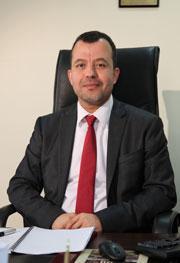Using AI to control energy for indoor agriculture
30 September 2024
Published online 11 July 2011

Qatar intends to become an internationally respected scientific base for the Arab world. In 2006, the country's head of state, Emir Hamad bin Khalifa Al Thani, committed to spending 2.8% of the country's gross domestic product on research — an investment that came to an estimated US$3.5 billion in 2010. Much of that money flows through the Qatar Foundation, which was set up in 1995 with a multi-billion dollar endowment from the emir. One big focus of research is stem cells, and a dedicated centre is set to open next year. With funding flowing freely, can Qatar negotiate ethical concerns and build the expertise necessary to become a world leader in the field? Nature asked Abdelali Haoudi, the foundation's vice-president for research, how he plans to do it.
Why are you investing in stem-cell research?
We founded the Qatar Biomedical Research Institute in 2007. It has five research centres, focusing on diabetes, cardiovascular disease, cancer, infectious disease and neurodegenerative disease. We realized that all five centres would benefit from stem-cell research. So we are setting up a stem-cell biobank, starting research and training with a number of international partners, organizing science and policy forums and addressing the ethical challenges. A stem-cell research centre will open in 2012, accompanied by a major international conference.
Can Qatar become a world leader in the field?
The goal is to develop a centre of excellence in stem-cell research in Qatar over the next five years. Our main challenge will be to develop an intellectual critical mass. Funding is not going to be a limiting factor; this is a great asset for us. For a number of years in the United States, for example, there were severe restrictions on federal funding. This research cannot happen without substantial funding and support — we are offering both.
Last year we sent six Qatari students to be trained in stem-cell research at institutions abroad, including the Harvard Stem Cell Institute in Cambridge, Massachusetts, the University of Cambridge, UK, and Imperial College London. In a couple of years' time, once they have their PhDs, they will come back and join the stem-cell research centre.
Does Islam allow the use of embryonic stem cells?
Many of the ethical implications surrounding stem-cell research are linked to religion. So we established a partnership with the James A. Baker III Institute for Public Policy at Rice University in Houston, Texas, to develop a policy on this.
In March 2009, we held an international workshop, and we invited scientists, ethicists, and religious experts from Islam, Judaism and Christianity. We found that Islam is actually very permissive when it comes to using embryonic tissue. Later that year, we organized a session just for Islamic scholars, and they came up with official rules that we call fatwa. They permit the use of embryonic stem cells for research and therapy, and are very important for scientists in this part of the world.
What do the fatwa say?
We can use tissues from embryos for up to 14 days after fertilization. We have to get the consent of the parents. We cannot create embryos specifically for research, and we cannot use the tissues for commercial purposes — only for basic research or to develop new therapies. If all these conditions are met, then destroying these fertilized eggs is nothing but the destruction of human cells that have not been enlivened with the human spirit, and using them is favourable to wasting them.
How did the religious scholars decide what was permissible?
There are three main sources. One is the Koran. Most of the key recommendations are there. The second is the Hadith — statements of the prophet. And for the third, the scholars come up with their own updated interpretations that are more suitable for the current time and situation. You are not going to find the technical details of stem cells in the Koran or the Hadith. So they have to innovate.
Do you also need to bring the public with you?
Reaching out to the public is extremely important. In May last year we organized a session in which a panel of scientists, ethics experts and religious scholars discussed the issue with the public, and it got a lot of interest. But that's not enough. We need to do more of that on a regular basis.
What research are you doing now?
We have not started embryonic stem-cell research yet, but we are already working with induced pluripotent stem cells at the campus of Weill Cornell Medical College in Qatar. One focus is diabetes, which is a major health concern for our country.
Do you hope to attract researchers from around the world?
If we want the research to have a global impact, we have to do it with others. No one is excluded, but we want to give special consideration to Arab scientists — expats who have trained in some of the best institutions in the world. Perhaps they are facing some limitations wherever they are at the moment, so we would love them to come and work with us.
This article is reproduced with permission from Nature 8 July 2011 doi:10.1038/news.2011.405
doi:10.1038/nmiddleeast.2011.88
Stay connected: